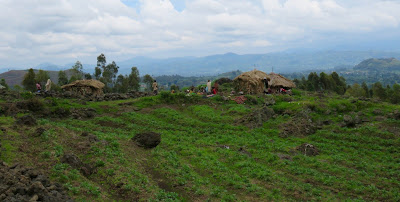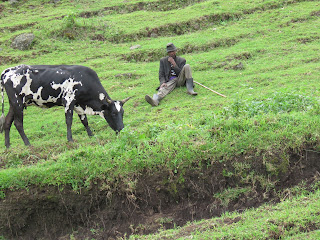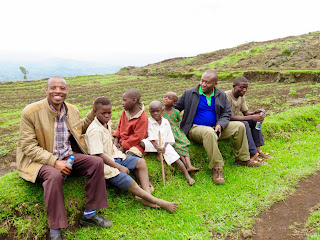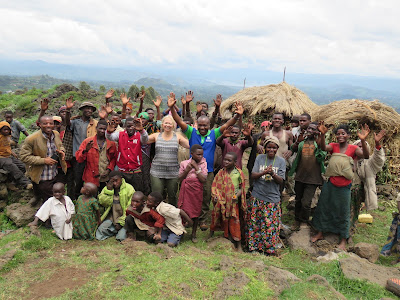Setting out on a nine-hour, 326 miles, road trip from the bustling, traffic-jammed Ugandan capital of Kampala heading south to the spectacular, volcanic mountains of Kisoro, we were on a mission.
Our unlikely little group comprised Obed, the Head of a
major NGO called ACODEV, with skilful driver, Edson at the wheel, and me in the
back seat mesmerised by the fast-moving, colourful scenery.
I was chuffed to have persuaded Mr Kabanda Obed, a dynamic
grassroots community development expert, jetlagged from a high powered
international conference with Bill Gates in Washington DC, to join me in this challenging
venture.
This epic trip, nine months in the planning, was finally
happening! The brainwave took hold last October when I visited Kisoro for a gruelling
gorilla trek while on safari with Absolute Africa. I met dedicated tour guide Ndabahariye
Joseph, who took my Mexican friend, Julio and me to meet the Batwa
tribespeople.
Displaced Outcasts
Back then, we discovered a dishevelled group of adults and
children living in a few tiny huts perched on a craggy hilltop, on a scrap of
unusable land owned by the neighbouring farmers. We were gobsmacked by their heart-wrenching
story of being evicted from their hunting grounds when massive tracts of
forests were gazetted as a national park to protect the endangered mountain
gorillas. These displaced tribes people now lived in extreme poverty without
the basics of survival – without proper homes, food security, water and
sanitation and with very little access to a sustainable livelihood, medical
care and education for their children, who suffered malnutrition and eye and
skin infections.
Joseph was their champion. He yearned for a breakthrough that
would transform the quality of life for the Batwa people. He worked closely
with the devoted team at the Mgahinga Community Development Organization (MCDO)
funded by a Swedish charity. However the Ugandan
government appeared to completely overlook the desperate plight of this victimised
community.
“My grandparents were evicted from the forests and suffered
hardship ever since so I feel strongly for all the people who were displaced,”
says Joseph.
And so I made a promise to Joseph that I would do whatever I
could to help the Batwa. I don’t know where that outlandish promise came from!
It welled up from somewhere in the depths of my being that responded to their
helpless and hopeless predicament. I believed there had to be a solution to
meeting basic survival needs in the advanced 21st century. I was
fired by my passionate belief in human rights and social justice that people
should not be condemned to live in abject poverty and misery, shame and
humiliation.
I had met Obed at a Tostan
training course in Senegal last July and was impressed by his outstanding
achievements over 14 years of empowering rural communities throughout Uganda.
Obed had perfected a five-step process of research, awareness-raising, capacity
building, activism and collaboration that took communities rife with
overwhelming problems such as post-war trauma, orphans, HIV/AIDS, horrendous
health problems, domestic violence and abject poverty into flourishing,
sustainable, safe and healthy communities.
Obed's Expertise
I knew Obed was THE MAN to take on the challenge of the
Batwa. So it was a joyful moment of sublime networking when Obed and Joseph,
two compassionate and strong crusaders, finally embraced in a bearhug at the
Rafiki guesthouse in Kisoro, run by the charming and capable Gloria.
We walked to the MCDO office and met Godfrey, Jackson and Abel and learned about their projects and initiatives such as enrolling some of the Batwa children into schools.
And they told us the backstory. As many as 25,000 tribespeople were evicted from the Mgahinga and Bwindi Gorilla National Parks in 1991. The small Batwa community that live on the Kisoro hilltop number around 58 adults with dozens of children. They have survived for 26 years, marginalised and shunned as outcasts, scavenging food from the farmers that work the fertile slopes, growing Irish potatoes, maize, corn and vegetables.
The next day, Obed and Joseph and me, joined by International
Co-ordinator, Kamanzi Festo and young Batwa leader, James, trekked through the
idyllic green hills, waving and calling to the children and men and women
swinging their hoes in the fields, side-stepping goats and cattle, awe-struck
by the heavenly views of the surrounding volcanoes and misty expanse of Lake
Mutanda.
The tribespeople greeted us with songs, dancing and drama
that told their story of eviction to protect the mountain gorillas they revered.
They are proud of their heritage, remembering how they once lived wild and free
in the beautiful forests, hunting buffalo and antelope and foraging for honey
and living safe and warm in caves.
Obed listened carefully to the community leaders’ passionate
pleas as they outlined their daily challenges and desperate needs.
Land is the Start
Having heard similar stories of struggling communities, Obed
identifies immediately that owning land is the first priority for these people.
He said: “You can’t build proper housing, you can’t build toilets, if you don’t
first own the land. Everything else follows from there; growing food and
finding sustainable work and accessing medical and education services.”
And he lays the responsibility clearly with the government
that failed 26 years ago to humanely relocate the tribes people on their own
land with decent housing.
He points out that funding exists. In a cynical political
move, the Ugandan government is currently giving around $8500USD to every MP to
campaign in a referendum to increase the presidential retirement age limit so
the aging President Museveni can stay in power.
Obed says it would cost the government very little to
purchase a plot of land for the Batwa people. And land would not just provide a
place to live; land would restore their dignity, hope and respect in the wider
community.
Healing the Pain
During our visit, one woman lay on the ground nursing painful
bruises from being beaten by a man when she ventured into town the previous
day. We sat and soothed her but the problem runs much deeper than words of
sympathy and Joseph’s efforts to take a doctor to the remote patient. The
community’s hostility to the Batwa is increasing. Everyone wants a solution to
this chronic problem of social outcasts.
After our hilltop visit, during lunch in the rustic Amajyambere
camp relentless torrential rain thundered
down on the tin roof and flooded the surrounding bush. While a welcome blessing
for the growing crops, I could only picture, with a shudder, the Batwa people
and their children huddling together in their tiny damp straw huts. Everyone
deserves shelter from the storm.
So our exuberant road trip from Kampala to Kisoro is just
the beginning. Obed and Joseph and the MCDO team will continue working together
to ensure the forgotten Batwa people, after 26 years of exile, will finally
find a place to call home.













No comments:
Post a Comment